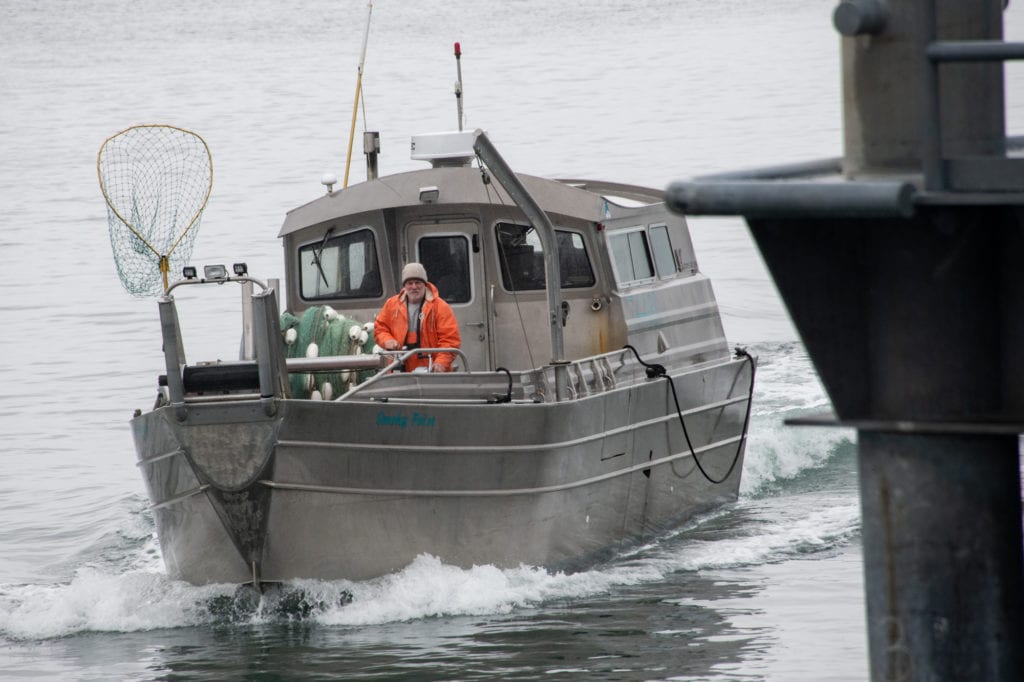
Federal fisheries managers met online in mid-May to approve emergency action necessitated by the impact of the novel coronavirus pandemic on economic and health concerns of Alaska’s halibut fisheries.
The session, announced in late April, allowed for harvests, processors and other fishing industry entities until one day in advance of the May 15 meeting to submit written comments through links on the North Pacific Fishery Management Council’s agenda on five emergency requests.
Those requests ranged from allowing all holders of individual fishing quota to make temporary transfers of that quota to eligible hired masters during the pandemic to increasing IFQ end-of-year rollover provisions.
The council approved the transfer for the rest of the 2020 season for quota shares owned by all halibut and sablefish IFQ holders, based on a request from 11 industry leaders. The council also recommended to the International Pacific Halibut Commission, a request from the halibut charter industry sector, that the IPHC modify bag limits and size restrictions for Area 2C and 3A for the rest of the 2020 season, and that IPHC remove vessel use cap rules for IFQ halibut harvested in regulatory Areas 4B, 4C and 4D for the remainder of the season. The latter request came from the Central Bering Sea Fishermen’s Association and the Deep Sea Fishermen’s Union.
In its decision to approve quota share transfers through the remainder of the season the NPFMC chose to make this modification without it being specific to harvesters with certain underlying health conditions or over 60 years of age, all included in a group identified at being at higher risk for becoming infected with COVID-19.
The letter requesting modification of the quota share transfer provisions also cited the complicated existing regulations and noted that objectives achieved would include reduced travel to and from Alaska communities, thus preserving social distance to the greatest extent possible, plus a reduced cost of mandatory quarantines.
Signers of the letter included Bob Alverson, general manager of the Fishing Vessel Owners Association; Linda Behnken, executive director of the Alaska Longliner Fishermen’s Association; Phillip Lestenkof, president of the Central Bering sea Fishermen’s Association; Luke Fanning, chief executive officer of the Aleutian Pribilof Islands Community Development Association; Robert Wurm, president of the Kodiak Vessel Owners’ Association, and others
Charter fishing vessel owners and associations, noting the significant number of cancelations and reduction in customer interest due to the pandemic, said that relaxing bag and size limits for charter anglers during the pandemic would allow for greater opportunities for Alaska residents and other anglers who had already completed their required 14-day quarantine in the state to bring home halibut.
The council agreed to recommend to the IPHC that for area 2C in Southeast Alaska that the one halibut daily bag limit be maintained, along with a reverse slot limit with an upper limit of 80 inches and lower limit of 45 inches for charter operators for the remainder of the season. The reverse slot limit rule prohibits retention of any halibut greater than or less than a specific number of inches. Current regulations for area 2C require that all halibut retained be less than or equal to 40 inches or greater in length or equal to 80 inches.
For area 3A in Southcentral Alaska, the council agreed to maintain the daily bag limit of two halibut, one of any size and a second fish equal to or less than 32 inches, with no annual limit and no daily closures, plus a limit of one daily on trips per halibut charter vessel and trips per charter halibut permit. Current regulations for area 3A allow charter anglers to keep only four halibut in a given year, and no charter boat fishing for halibut on Tuesdays and Wednesdays.
The council took no action on a requested change in the allowed rollover cap, from stakeholder Eric Rosvold, who argued that the pandemic had disrupted normal marketing channels for halibut and sablefish and that an increased rollover would to the next season would help protect great financial loss.
Rosvold asked that the IFQ rollover cap be raised from 10 percent to 30 percent for the 2020 season and to 20 percent for the 2021 season, then revert to 10 percent in 2022.
Nor did the council take any action on a proposal from Bill Connor of Cape Reliant Fisheries to extend the halibut and sablefish season to a year-round fishery.
Connor contended that with the pandemic markets are limited, processors are limiting deliveries, the chance of infections from the COVID-19 virus are real and prices are at all-time lows. A year-round season would help the distribution chain and help possible protein shortages occurring in the beef and pork sectors, he said.





